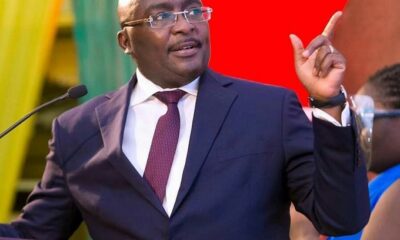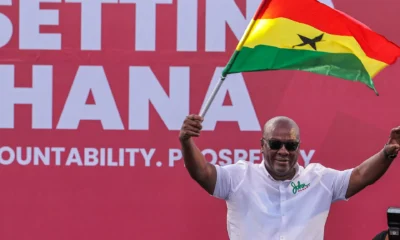Strictly Personal
The electorate and governance in the Ghanaian political system, By Michael Akeno
Published
2 years agoon

Abraham Lincoln, a one-time great President of America, made the following landmark statement: “Government of The People, By The People, For The People”
This is the popular definition of democracy, championed and propagated by America all over the world, to countries that practice this system of governance at the present time.
Ghana, a developing country in the modern world today, practises this system of governance at the present time.
In order to ensure an effective and efficient practice of democracy in the Ghanaian situation to be on the same level as prevails in other countries and America, the greatest and most powerful nation on earth today, there is the need for a thorough and elaborate education for the Ghanaian electorate as to what entails in the practice of this democratic system of governance.
This is so and very necessary because there had been deep ignorance among some of the Ghanaian electorate pertaining to a democratic system of governance.
Since Ghana embarked on the democratic system of governance, it can be observed that the majority of the electorate in Ghana does display ignorance in the choosing of leaders and other political office holders of the government of the country.
There are a number of negative factors for this unfortunate situation that this article seeks to identify and address as a way of minimising this situation, if not eradicating it completely from the body system of Ghanaian politics.
The first factor that one can identify is that of low education and illiteracy. The second is ethnicism and sectionalism. The third is selfishness and avarice. The fourth is over-ambition. The fifth is corruption.
I shall attempt in the following to offer some suggestions for the minimising and eradication of this persistent and problematic situation in the body politics of Ghana.
Although the ratio of literacy and illiteracy rate in Ghana is higher as compared to other African countries, there is an urgent need to step up the literacy rate in Ghana so that a great number of Ghanaians will be able to read and write.
This will facilitate easy communication, interaction, and understanding among Ghanaians; and this in turn will bring about a good understanding of national issues and aspirations of the developmental process of the country.
To this end, there is the need therefore for successive governments to pay priority attention to the formal education of every school going age Ghanaian child; and also to organise a country-wide, mass illiteracy education campaign programmes with the aim of eradicating illiteracy in the country among Ghanaians who cannot read and write.
Ethnicism and sectionalism constitute a major obstacle in Ghanaian politics; and efforts must be made by all Ghanaians, both high and low stature to eliminate this unpleasant situation in the country.
Ghanaians must therefore learn to live in unity, peace, and tolerance; seeing each other as brother and sister with one common destiny in the developmental process of the country. Ghana belongs to all Ghanaians irrespective of where one comes from. And with this mentality and consciousness, Ghanaians can move together as one people with a common destiny.
Avarice and selfishness must be shunned and uprooted among Ghanaians to enable Ghanaians to show much love to each other. This will enhance the speedy development of the country.
The inordinate desire to get access to political rule and authority to amass wealth, no matter what is involved must be eschewed by all Ghanaians. This will ensure peace, unity, and justice in Ghanaian society so that Ghana will move healthily to experience speedy economic growth, development, and prosperity.
Self-centeredness and over-ambition had been the bane and setback of any realistic and meaningful development to many a nation in Africa, and Ghana should not fall a victim to these militating and negative factors for political control and rule.
Corruption and immoralities had contributed to the fall of great nations in the past and in modern times.
All forms of corruptible practices must be uprooted from Ghanaian society so that virtues and moralities will prevail.
When Ghanaians are guided by morality and upright living styles, the country will speedily experience optimum economic growth, development, and prosperity.
Ghanaians must therefore learn to become disciplined in their lifestyles, so that they can work together in faith and honesty with each other to bring about a speedy development of the country.
In the matter of choosing candidates for the various political offices and leaders of the country, the electorate by virtue of good education, clear mentality, and consciousness must endeavour at all times to choose the right and honest people to occupy political offices.
The electorate must not choose people for political offices by virtue of where these people come from in the country; but strictly by their capabilities and abilities to deliver to the best interests of the country.
This is what prevails in the most advanced and most progressive nations of the world such as America, Britain, France, Germany, Italy, India, Japan, etc. The electorates are highly educated and well-informed, and they exercise their franchise by carefully choosing the right and capable candidates to occupy the various political offices of governance to ensure the progress and advancement of their countries. To this end, the electorates of these countries choose their candidates for governor, not on the basis of ethnicism, sectionalism, or political organization; but strictly on desirable qualities and the needs and interests of their countries.
In fact, this simplistic, naïve, and ill-informed way of voting practice is popular in African countries including Ghana, of course, the star of Africa!
This is most unfortunate and unacceptable for the smooth and healthy developmental process of African countries in their continual efforts to experience economic growth, development, and prosperity.
It is uncivilised, barbaric, and retrogressive as it is the root cause of conflicts and dissatisfaction, which often plunge African countries into civil wars and genocides that had besieged African countries in contemporary times.
When this occurs, it impedes stability, progress, and development; and introduces chaos in African countries.
Ghana is the star of African liberation and aspirations; and so she must strive hard to reverse and change this unpleasant situation in order to bring about sanity, justice, and a healthy developmental process in the life of African countries for the benefit of posterity.
Compared to other African countries situations, Ghana appears to have a long, somewhat peaceful, and sustaining democratic system of governance.
This is commendable and must be further sustained for Ghana to experience healthy economic growth, development, and prosperity, which will become a shining example for the rest of African countries to follow.
The Ghanaian experience up to date needs to be improved upon as it is fraught with the anomalies and shortcomings that had been highlighted in this article.
The Ghanaian experience has therefore not reached the stage of perfection. To this end, it is highly imperative for the Ghanaian electorate to become more enlightened and well-informed in the choice of political leaders and representation so that Ghana can become more peaceful and strongly united to experience economic growth, development, and prosperity.
Ghanaian political leaders must also try to become more sincere and honest in the devising of their political manifestos for the development and prosperity of the country.
They must also try to refrain in their campaigns for political power and leadership, the fanning of sentiments, of ethnicism, and divisiveness in their utterances; as this will generate and reinforce the conditions for divisiveness and sectionalism in the rule of the country; which are at variance in the smooth and healthy development of the country.
Ghana must rise above all the unhealthy conditions that had been mentioned in this article in order to pave a healthy and enlightened way of co-existence of the rulers and the ruled of the country to promote economic growth, development, and prosperity.
In conclusion, I reiterate that the electorate and governance conditions must undergo a rigorous transformation and change by the suggestions that had been advanced in this article for a new good chapter to be opened in the democratic system of governance of the country which at the moment appear to be shaky and vulnerable from a critical point of view.
A healthy and well-informed democratic system of governance must prevail in the present Ghanaian political situation for the rest of African countries to follow.
This is a big challenge and test to Ghanaian democracy practice.
A citizen casting his vote with the help of an electoral official
BY MICHAEL AKENOO: THEATRE CRITIC
You may like
-


UNESCO lists Ghana’s Kente cloth as cultural heritage
-


Ghana will not leave IMF but wants adjustments, says President-elect
-


Ghanaian singer Afua Asantewaa takes another shot at GWR with sing-a-thon
-


#GhanaDecides : Ghana’s former VP Bawumia concedes defeat (Video)
-


Former Ghanaian footballer narrates how he reduced his age from 35 to 19 to play professional football abroad
-


Ghana’s ex-president Mahama returns to power after close contest with former VP
Strictly Personal
Let’s merge EAC and Igad, By Nuur Mohamud Sheekh
Published
3 weeks agoon
November 27, 2024
In an era of political and economic uncertainty, global crises and diminishing donor contributions, Africa’s regional economic communities (RECs) must reimagine their approach to regional integration.
The East African Community (EAC) and the Intergovernmental Authority on Development (Igad), two critical RECs in East Africa and the Horn of Africa have an unprecedented opportunity to join forces, leveraging their respective strengths to drive sustainable peace and development and advance regional economic integration and promote the African Continental Free Trade Area (AfCFTA).
Already, four of the eight Igad member states are also members of the EAC and, with Ethiopia and Sudan showing interest, the new unified bloc would be formidable.
Igad’s strength lies in regional peacemaking, preventive diplomacy, security, and resilience, especially in a region plagued by protracted conflicts, climate challenges, and humanitarian crises. The EAC, on the other hand, has made remarkable strides in economic integration, exemplified by its Customs Union, Common Market, and ongoing efforts toward a monetary union. Combining these comparative advantages would create a formidable entity capable of addressing complex challenges holistically.
Imagine a REC that pairs Igad’s conflict resolution strengths with the EAC’s diplomatic standing and robust economic framework. Member states of both are also contributing troops to peacekeeping missions. Such a fusion would streamline efforts to create a peaceful and economically prosperous region, addressing the root causes of instability while simultaneously promoting trade investment and regional cooperation.
These strengths will be harnessed to deal with inter-state tensions that we are currently witnessing, including between Ethiopia and Somalia over the Somaliland MoU, strained relations between Djibouti and Eritrea, and the continually deteriorating relations between Eritrea and Ethiopia.
The global economy experienced as a result of the COVID-19 pandemic, compounded by the Ukraine war and competing global crises, has strained donor countries and reduced financial contributions to multilateral organisations and African RECs. Member states, many of which are grappling with fiscal constraints, are increasingly unable to fill this gap, failing to make timely contributions, which is in turn affecting key mandate areas of Igad and EAC, and staff morale.
A merger between Igad and EAC would alleviate this financial pressure by eliminating redundancies. Shared administrative systems, integrated programmes, and a unified leadership structure would optimise resources, enabling the new REC to achieve more with less. Staff rationalisation, while sensitive, is a necessary step to ensure that limited funds are channelled toward impactful initiatives rather than duplicative overheads.
The African Union (AU) envisions a fully integrated Africa, with RECs serving as the building blocks of the AfCFTA. A unified EAC-Igad entity would become a powerhouse for regional integration, unlocking economies of scale and harmonising policies across a wider geographical and economic landscape.
This merger would enhance the implementation of the AfCFTA by creating a larger, more cohesive market that attracts investment, fosters innovation, and increases competitiveness. By aligning trade policies, infrastructure projects, and regulatory frameworks, the new REC could serve as a model for others, accelerating continental integration.
The road to integration is not without obstacles. Political will, divergent institutional mandates, and the complexity of harmonising systems pose significant challenges. However, these hurdles are surmountable through inclusive dialogue, strong leadership, and a phased approach to integration.
Member states must prioritise the long-term benefits of unity over short-term political considerations. Civil society, the private sector, the youth, and international partners also have a critical role to play in advocating for and supporting this transformative initiative.
The time for EAC and Igad to join forces is now. By merging into a single REC, they would pool their strengths, optimise resources, and position themselves as a driving force for regional and continental integration. In doing so, they would not only secure a prosperous future for their citizens and member states but also advance the broader vision of an integrated and thriving Africa.
As the world grapples with crises, Africa must look inward, embracing the power of unity to achieve its potential. A combined Igad-EAC is the bold step forward that the continent needs.
Nuur Mohamud Sheekh, a diplomatic and geopolitical analyst based in London, is a former spokesperson of the Igad Executive Secretary. X: @NuursViews
Strictly Personal
Budgets, budgeting and budget financing, By Sheriffdeen A. Tella, Ph.D.
Published
4 weeks agoon
November 20, 2024
The budget season is here again. It is an institutional and desirable annual ritual. Revenue collection and spending at the federal, State and local government levels must be authorised and guided by law. That is what budget is all about. A document containing the estimates of projected revenues from identified sources and the proposed expenditure for different sectors in the appropriate level of government. The last two weeks have seen the delivery of budget drafts to various Houses of Assembly and the promise that the federal government would present its draft budget to the National Assembly.
Do people still look forward to the budget presentation and the contents therein? I am not sure. Citizens have realised that these days, governments often spend money without reference to the approved budget. A governor can just wake up and direct that a police station be built in a location. With no allocation in the budget, the station will be completed in three months. The President can direct from his bathroom that 72 trailers of maize be distributed to the 36 states as palliatives. No budget provision, and no discussion by relevant committee or group.
We still operate with the military mentality. We operated too long under the military and of the five Presidents we have in this democracy, two of them were retired military Heads of State. Between them, they spent 16 years of 25 years of democratic governance. Hopefully, we are done with them physically but not mentally. Most present governors grew up largely under military regimes with the command system. That is why some see themselves as emperor and act accordingly. Their direct staff and commissioners are “Yes” men and women. There is need for disorientation.
The importance of budget in the art of governance cannot be overemphasized. It is one of the major functions of the legislature because without the consideration and authorisation of spending of funds by this arm of government, the executive has no power to start spending money. There is what we refer to as a budget cycle or stages. The budget drafting stage within the purview of the executive arm is the first stage and, followed by the authorisation stage where the legislature discusses, evaluates and tinkers with the draft for approval before presenting it to the President for his signature.
Thereafter, the budget enters the execution phase or cycle where programmes and projects are executed by the executive arm with the legislature carrying out oversight functions. Finally, we enter the auditing phase when the federal and State Auditors verify and report on the execution of the budgets. The report would normally be submitted to the Legislature. Many Auditor Generals have fallen victim at this stage for daring to query the executives on some aspects of the execution in their reports.
A new budget should contain the objectives and achievements of the preceding budget in the introduction as the foundation for the budget. More appropriately, a current budget derives its strength from a medium-term framework which also derives its strength from a national Development Plan or a State Plan. An approved National Plan does not exist currently, although the Plan launched by the Muhammadu Buhari administration is in the cooler. President Tinubu, who is acclaimed to be the architect of the Lagos State long-term Plan seems curiously, disillusioned with a national Plan.
Some States like Oyo and Kaduna, have long-term Plans that serve as the source of their annual budgets. Economists and policymakers see development plans as instruments of salvation for developing countries. Mike Obadan, the former Director General of the moribund Nigeria Centre for Economic and Management Administration, opined that a Plan in a developing country serves as an instrument to eradicate poverty, achieve high rates of economic growth and promote economic and social development.
The Nigerian development plans were on course until the adoption of the World Bank/IMF-inspired Structural Adjustment Programme in 1986 when the country and others that adopted the programme were forced to abandon such plan for short-term stabilisation policies in the name of a rolling plan. We have been rolling in the mud since that time. One is not surprised that the Tinubu administration is not looking at the Buhari Development Plan since the government is World Bank/IMF compliant. It was in the news last week that our President is an American asset and by extension, Nigeria’s policies must be defined by America which controls the Bretton Woods institutions.
A national Plan allows the citizens to monitor quantitatively, the projects and programmes being executed or to be executed by the government through the budgeting procedure. It is part of the definitive measures of transparency and accountability which most Nigerian governments do not cherish. So, you cannot pin your government down to anything.
Budgets these days hardly contain budget performance in terms of revenue, expenditure and other achievements like several schools, hospitals, small-scale enterprises, etc, that the government got involved in successfully and partially. These are the foundation for a new budget like items brought forward in accounting documents. The new budget should state the new reforms or transformations that would be taking place. Reforms like shifting from dominance of recurrent expenditure to capital expenditure; moving from the provision of basic needs programmes to industrialisation, and from reliance on foreign loans to dependence on domestic fund mobilisation for executing the budget.
That brings us to the issue of budget deficit and borrowing. When an economy is in recession, expansionary fiscal policy is recommended. That is, the government will need to spend more than it receives to pump prime the economy. If this is taken, Nigeria has always had a deficit budget, implying that we are always in economic recession. The fact is that even when we had a surplus in our balance of payment that made it possible to pay off our debts, we still had a deficit budget. We are so used to borrowing at the national level that stopping it will look like the collapse of the Nigerian state. The States have also followed the trend. Ordinarily, since States are largely dependent on the federal government for funds, they should promote balanced budget.
The States are like a schoolboy who depends on his parents for school fees and feeding allowance but goes about borrowing from classmates. Definitely, it is the parents that will surely pay the debt. The debt forgiveness mentality plays a major role in the process. Having enjoyed debt forgiveness in the past, the federal government is always in the credit market and does not caution the State governments in participating in the market. Our Presidents don’t feel ashamed when they are begging for debt forgiveness in international forum where issues on global development are being discussed. Not less than twice I have watched the countenance of some Presidents, even from Africa, while they looked at our president with disdain when issues of debt forgiveness for African countries was raised.
In most cases, the government, both at the federal and state cannot show the product of loans, except those lent by institutions like the World Bank or African Development Bank for specific projects which are monitored by the lending institutions. In other cases, the loans are stolen and transferred abroad while we are paying the loans. In some other cases, the loans are diverted to projects other than what the proposal stated. There was a case of loans obtained based on establishing an international car park in the border of the State but diverted to finance the election of a politician in the State. The politician eventually lost the election but the citizens of the State have to be taxed to pay the loan. Somebody as “Nigeria we hail thee”.
Transformation in budgeting should commence subsequently at the State and federal level. Now that local government will enjoy some financial autonomy and therefore budgeting process, they should be legally barred from contracting foreign loans. They have no business participating in the market. They should promote balanced budget where proposed expenditures must equal the expected revenues from federal and internal sources. The State government that cannot mobilise, from records, up to 40 percent of its total budget from IGR should not be supported to contract foreign loans. The States should engage in a balanced budget. The federal government budget should shift away from huge allocations to recurrent expenditure towards capital expenditure for capital formation and within the context of a welfarist state.
Sheriffdeen A. Tella, Ph.D.
EDITOR’S PICK


Nigerian woman trafficked to Iraq cries out for help, begs to return home
A young Nigerian lady identified as Odunayo Eniola Isaac, who is a victim of human trafficking, has cried out for...


DR Congo sues tech giant Apple over illegal mineral exploitation
The Democratic Republic of Congo (DRC), has filed a criminal case against the European subsidiaries of tech giant, Apple, accusing...


UNESCO lists Ghana’s Kente cloth as cultural heritage
The iconic Ghanaian Kente, a piece of clothing, has been recognized as a cultural heritage on UNESCO’s Representative List of...


Zambia: FOX report highlights persistent media harassment, calls for reforms
A new Freedom of Expression (FOX) report by the Media Institute for Southern Africa (MISA) Zambia, has raised concerns over...


Egyptian court upholds ex-presidential candidate Ahmed Tantawy’s sentence
Former presidential candidate, Ahmed Tantawy, and his campaign manager, Mohamed Abou El-Diar, were found guilty of faking election paperwork, and...


Court orders Uganda to compensate LRA war crimes victims
Uganda’s tribunal has ordered the government to pay up to 10 million Ugandan shillings ($2,740) to each victim of Lord’s...


Nigeria: 614,937 killed, 2.2m abducted in 1 year— Report
A new report released on Tuesday by the National Bureau of Statistics (NBS) has revealed that over 614,937 Nigerians were...


Seeking to expand ties in Africa, Indonesia’s Prabowo attends D-8 economic meeting in Egypt
According to the government, Indonesian President, Prabowo Subianto, travelled to Egypt on Tuesday to attend meetings of the D-8 Organisation...


M23 Angola peace talks break down as Congo, Rwanda dash hopes
Hopes of an agreement to end Congo’s M23 rebel conflict, which has displaced over 1.9 million people, were dashed when...


Nigeria obtains $600 million international loans for agriculture
To promote food security and rural development, the Nigerian government, through the Ministry of Agriculture and Food Security, has obtained...
Trending
-

 VenturesNow1 day ago
VenturesNow1 day agoNigeria’s November inflation rate hits 34.60%
-

 VenturesNow1 day ago
VenturesNow1 day agoNigeria obtains $600 million international loans for agriculture
-

 VenturesNow1 day ago
VenturesNow1 day agoIMF’s latest board reviews result in $182 million to Rwanda
-

 Politics1 day ago
Politics1 day agoM23 Angola peace talks break down as Congo, Rwanda dash hopes


